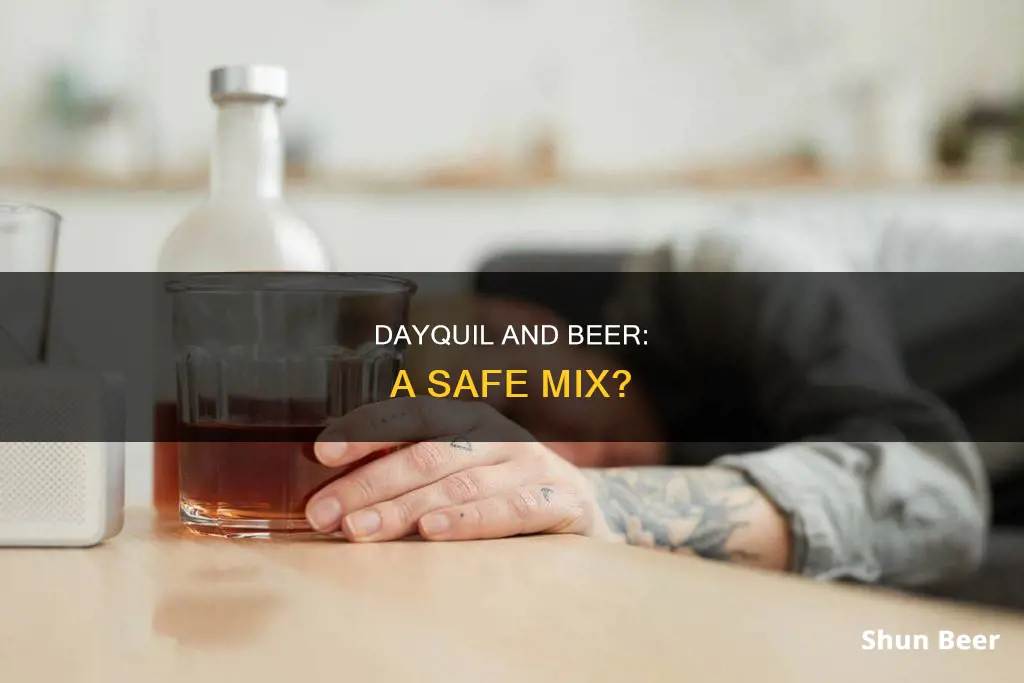
Mixing DayQuil and alcohol can have harmful effects on the body and lead to severe health complications. DayQuil is a popular over-the-counter medication used to treat symptoms of the common cold and flu, such as aches, pains, sore throat, and fever. It contains a combination of active ingredients, including acetaminophen, a pain reliever and fever reducer, dextromethorphan, a cough suppressant, and phenylephrine, a nasal decongestant. On the other hand, alcohol is a depressant that can affect the central nervous system, leading to impaired judgment, slurred speech, and lack of coordination. When combined, DayQuil and alcohol can cause enhanced drowsiness, impaired coordination, increased heart rate and blood pressure, liver damage, and even respiratory depression. Therefore, it is generally recommended to refrain from consuming alcohol while taking DayQuil to avoid these potential adverse effects and health risks.
| Characteristics | Values |
|---|---|
| Can I drink beer with DayQuil? | It is not recommended to mix DayQuil and alcohol. |
| Wait time | It is recommended to wait for 4-6 hours after taking DayQuil to drink alcohol. |
| Side effects | Mixing DayQuil and alcohol can cause drowsiness, impaired coordination, increased heart rate, increased blood pressure, liver damage, gastrointestinal distress, and more. |
| Treatment for addiction | Cognitive Behavioral Therapy and Dialectical Behavioral Therapy are commonly used to treat DayQuil and alcohol addiction. |
What You'll Learn

Increased risk of liver damage
Combining DayQuil and alcohol can have severe adverse effects on the body, and one of the most prominent risks is the potential for liver damage. Both substances are metabolized by the liver, and when combined, they can overwhelm the organ, leading to severe liver complications.
DayQuil contains acetaminophen, a common pain reliever and fever reducer. Acetaminophen is safe when taken as directed; however, it can be toxic to the liver when combined with alcohol. The liver breaks down acetaminophen into several substances, including NAPQI, which is particularly harmful to the liver. Alcohol consumption, especially in excessive amounts, can deplete the body's levels of glutathione, a powerful antioxidant that helps neutralize NAPQI and prevent liver cell damage. As a result, the buildup of NAPQI can lead to severe liver damage or even liver failure.
The risk of liver damage is further exacerbated for individuals who drink heavily or have a history of alcohol abuse. Chronic alcohol consumption lowers glutathione levels, making it easier for NAPQI to accumulate and cause harm. Therefore, it is crucial for individuals who regularly consume large amounts of alcohol to refrain from taking DayQuil simultaneously.
In addition to liver damage, combining DayQuil and alcohol can also increase the risk of gastrointestinal bleeding, stomach ulcers, and kidney problems. The combination of these two substances can irritate and damage the stomach lining, leading to potential bleeding. Moreover, studies have shown that mixing acetaminophen and alcohol may also increase the risk of developing kidney disease.
To minimize the risk of liver damage and other adverse effects, it is strongly advised to refrain from consuming alcohol while taking DayQuil. Waiting for at least 4 to 6 hours after taking DayQuil before consuming alcohol is generally considered safe, as the medication would have left the body by then. However, it is important to note that this timeframe may vary depending on individual factors, and seeking personalized medical advice from a healthcare professional is always recommended.
Drinking Beer on Gulf Shores Beach: What's Allowed?
You may want to see also

Intensified drowsiness and dizziness
Combining DayQuil and alcohol can lead to intensified drowsiness and dizziness. Both substances can cause drowsiness and dizziness on their own, but when taken together, these effects are amplified. DayQuil contains antihistamines, which are known to cause drowsiness. Alcohol, as a depressant, can also induce drowsiness and impair coordination. As a result, mixing DayQuil and alcohol can significantly increase the risk of accidents or injuries.
The intensified drowsiness and dizziness from mixing DayQuil and alcohol can be particularly dangerous for individuals operating heavy machinery or performing tasks that require alertness and attention. It is crucial to refrain from driving or engaging in activities that demand mental alertness until the effects of both substances have worn off.
Additionally, the combination of DayQuil and alcohol can lead to respiratory depression, a potentially life-threatening condition where breathing slows down or stops. Both substances have sedative effects on the central nervous system, and when combined, they can cause a greater degree of sedation and impaired coordination. This can further increase the risk of accidents and injuries.
The intensified drowsiness and dizziness caused by mixing DayQuil and alcohol can also be a sign of a bigger issue, such as substance use disorder or addiction. Some individuals may mix DayQuil and alcohol to enhance the effects of alcohol or to counteract negative side effects like congestion. However, this behaviour can lead to the development of tolerance, dependence, or addiction, increasing the risk of harmful health outcomes.
To avoid intensified drowsiness and dizziness, it is essential to refrain from mixing DayQuil and alcohol. It is recommended to wait at least 4 to 6 hours after taking DayQuil before consuming alcohol, as the effects of DayQuil can last for up to 6 hours. Additionally, consulting a healthcare professional or pharmacist for personalized advice is always advisable, especially for individuals with underlying health conditions or those taking other medications.
Beer as a Hair Conditioner: Does it Work?
You may want to see also

Potential for allergic reactions
DayQuil is a common over-the-counter medication that helps relieve symptoms of a cold or the flu. It contains the drugs acetaminophen, dextromethorphan, and phenylephrine. While DayQuil is generally safe to use, it may cause allergic reactions in some individuals.
Allergic reactions to DayQuil are rare but can be serious and sometimes deadly. Symptoms of an allergic reaction include:
- Rash
- Hives
- Itching
- Red, swollen, blistered, or peeling skin with or without fever
- Wheezing
- Tightness in the chest or throat
- Trouble breathing, swallowing, or talking
- Unusual hoarseness
- Swelling of the mouth, face, lips, tongue, or throat
If you experience any of these symptoms while taking DayQuil, seek immediate medical attention. Do not wait for the symptoms to get worse, as allergic reactions can be life-threatening.
In addition to these common symptoms, some people may also experience a severe skin reaction called Stevens-Johnson syndrome or toxic epidermal necrolysis. This reaction can cause red, swollen, blistered, or peeling skin, as well as red or irritated eyes, and sores in the mouth, throat, nose, or eyes. This reaction is rare but can be life-threatening, so it is important to seek medical help right away if you experience any of these symptoms.
It is important to note that alcohol can increase the risk of developing an allergic reaction to DayQuil. Alcohol interacts with the active ingredients in DayQuil and can make side effects, such as nervousness and dizziness, worse. Therefore, it is recommended to avoid drinking alcohol while taking DayQuil and to consult a healthcare professional if you have any concerns.
Beer and Azithromycin: What You Should Know
You may want to see also

Increased heart rate and blood pressure
Combining DayQuil and alcohol can have adverse effects on the body, and it is not recommended to mix the two. One of the most common risks of doing so is increased heart rate and blood pressure.
DayQuil often contains decongestants such as phenylephrine or pseudoephedrine, which can increase heart rate and blood pressure. Alcohol can also lead to a temporary spike in blood pressure. When combined, these substances can exacerbate these effects, putting individuals with cardiovascular issues at greater risk.
The active ingredients in DayQuil, such as dextromethorphan, phenylephrine, and acetaminophen, can interact with alcohol in harmful ways. Dextromethorphan, a cough suppressant, and phenylephrine, a decongestant, can have sedative effects on the central nervous system when combined with alcohol, leading to increased drowsiness, dizziness, and impaired coordination. This combination can also cause respiratory depression, a potentially life-threatening condition where breathing slows down or stops.
Additionally, both DayQuil and alcohol are metabolized by the liver, and combining them can strain the organ as it works to process both substances simultaneously. This can lead to liver damage and other health complications, especially with regular or excessive consumption.
The effects of mixing DayQuil and alcohol can vary depending on individual factors such as physiology, age, weight, metabolism, liver health, and alcohol tolerance. However, it is generally recommended to wait at least 4-6 hours after taking DayQuil before consuming alcohol, and even then, alcohol intake should be moderate.
Drinking Beer in NYC: Open Secrets and Legalities
You may want to see also

Risk of internal bleeding
Mixing DayQuil and alcohol can be dangerous and can lead to a number of harmful effects on the body. One of the potential consequences of combining these substances is the risk of internal bleeding.
DayQuil is an over-the-counter medication that is commonly used to treat symptoms of the cold and flu, such as aches and pains, sore throat, sneezing, fever, headache, and cough. It contains a combination of acetaminophen, dextromethorphan, and phenylephrine. These ingredients can interact with alcohol in different ways, depending on the individual.
One of the main concerns with mixing DayQuil and alcohol is the increased risk of liver damage. Acetaminophen, one of the active ingredients in DayQuil, is broken down by the liver, and excessive consumption can lead to liver toxicity and even liver failure. Alcohol is also processed by the liver, and when combined with acetaminophen, the risk of liver damage is significantly increased. This risk is particularly high for individuals who consume more than three alcoholic drinks per day or have underlying liver problems.
In addition to liver damage, mixing DayQuil and alcohol can also lead to other serious side effects. Dextromethorphan, another ingredient in DayQuil, can cause respiratory depression and heavy sedation when mixed with alcohol. This can result in dangerously slow breathing and even loss of consciousness. Additionally, phenylephrine, the third active ingredient in DayQuil, can interact with alcohol to cause confusion, dizziness, lightheadedness, respiratory issues, and loss of balance.
The potential for internal bleeding arises from the combined effects of alcohol and the ingredients in DayQuil on the body's blood vessels and coagulation system. Alcohol can affect the production and function of platelets, which are essential for blood clotting. Additionally, phenylephrine, as a decongestant, works by constricting blood vessels. When combined with alcohol, this effect on blood vessels can disrupt the normal balance of coagulation and increase the risk of internal bleeding.
To minimize the risk of internal bleeding and other harmful effects, it is generally recommended to refrain from mixing DayQuil and alcohol. If an individual chooses to consume alcohol while taking DayQuil, it is crucial to wait at least 4-6 hours after taking a dose of DayQuil, as its effects can last for several hours. Additionally, consulting with a healthcare professional or reading the medication label is advised to ensure safe use.
Drinking Beer in Dubai: What's Allowed and What's Not
You may want to see also
Frequently asked questions
No, it is not safe to mix DayQuil and alcohol. DayQuil contains ingredients such as acetaminophen, dextromethorphan, and phenylephrine, which can have complicated and harmful reactions when combined with alcohol. These reactions may include liver damage, respiratory depression, and increased risk of overdose or death.
Mixing DayQuil and alcohol can lead to several harmful side effects, including impaired coordination, increased heart rate and blood pressure, difficulty concentrating, gastrointestinal distress, and enhanced drowsiness. These effects can be amplified when combined, making it dangerous to perform tasks requiring alertness, such as driving.
It is generally recommended to wait for at least 4-6 hours after taking DayQuil before consuming alcohol. This allows enough time for the effects of DayQuil to wear off and reduces the risk of adverse interactions between the two substances. However, it is important to note that the safe time frame may vary depending on individual factors, and it is always advisable to consult a healthcare professional for personalized advice.







